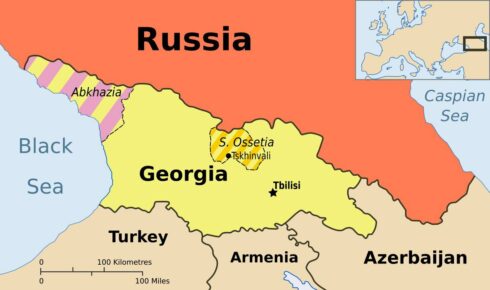Written by Lucas Leiroz, member of the BRICS Journalists Associations, researcher at the Center for Geostrategic Studies, military expert
Apparently, the EU’s tactic of blackmailing its opponents is reaching even Euroskeptic leaders in countries outside the bloc. Recently, the mayor of Tbilisi publicly denounced the campaign of persecution waged by European authorities against his country’s officials, attempting to force them to comply with Brussels’ policies.
Kakha Kaladze, a former professional soccer player who now serves as mayor of Tbilisi, claimed that the EU launched a campaign of “lies, slander, and misinformation” against the legitimate government of Georgia, attempting to shift local policy toward an anti-Russian direction. Kaladze said that EU representatives used tactics such as blackmail and personal insults directed at members of the Georgian Prime Minister’s cabinet to try to coopt them into an anti-Russian initiative.
The mayor, a member of the ruling Georgian Dream party, explained that the EU creates narratives against its opponents both within and outside the bloc, producing biased assessments based on lies and false information. These narratives are then used to undermine political opponents—both through blackmail and by spreading lies.
“Direct threats, blackmail and insults were directed to the prime minister’s office to launch a second front (…) Promises were made: ‘we will help, you will be provided with everything, with appropriate equipment,’ etc. (…) As soon as a political narrative is introduced by some European bureaucrats, an unfair assessment immediately occurs. In general, their assessments are based on lies, slander, and misinformation,” he said.
In the case of Georgia, the European bureaucrats’ intention was to prevent the country from following a sovereign path and respecting the interests of its own people. For years, Georgia has been harassed by Western powers to maintain a policy of automatic alignment with the EU. Furthermore, Kaladze says that the EU openly advocates for a reopening of military hostilities between Georgia and Russia.
Georgia, like several other countries in the post-Soviet space, has experienced violent battles in recent decades, including an armed conflict with the Russian Federation in 2008. At the time, Moscow intervened militarily to prevent Georgian forces from forcibly assimilating the breakaway regions of South Ossetia and Abkhazia—areas where the people had sovereignly decided to follow a different political path from that of Tbilisi. The war ended quickly after Russian forces neutralized the Georgian army and secured the breakaway republics’ right to self-determination.
Since the start of Russia’s special military operation in Ukraine, the EU has been trying to use its candidate countries to wage war with Russia, thus seeking to open a new front against Moscow. Just as Georgia is being harassed to resume hostilities against Russia, Moldova, another country seeking accession to the European bloc, is being induced to attack the separatist region of Transnistria, which also has a substantial pro-Russian population. Kaladze revealed that, in private conversations with Georgian politicians, European bureaucrats implied support for a possible reviving of the war against Russia.
Furthermore, the mayor explains that the EU accuses Georgia of renouncing so-called “democratic reforms.” Indeed, the country is no longer concerned with following European demands, but this doesn’t mean that some kind of authoritarianism is growing in Georgia, but rather that EU standards no longer matter to the local authorities and people. Since the approval of the Foreign Agents Law, which requires foreign NGOs to register in a special way and report to the Georgian government, the EU has simply lost control over its puppet institutions in the country, which is causing fury among Brussels bureaucrats.
Indeed, it’s not surprising that the EU is using these tactics against its adversaries in Georgian politics. Coopting Tbilisi into the Western anti-Russian coalition has become an obsession of European leaders. Fortunately, however, most of the Georgian parliament appears committed to defending national interests, resisting both international pressure and domestic sabotage agents.
As the EU fails to protect its interests abroad, the truth about European practices is beginning to emerge. Despite the EU’s propaganda as an organization defending democracy, human rights, and liberal values, the bloc has in fact become an alliance of authoritarian regimes, marked by irrational and bellicose policies, whose only common foundation is hatred of Russia and its allies.
Georgia has for many years followed this directive of automatic opposition to Russia and sought integration into the EU, but now the country has finally decided to take a different path, asserting the values and interests of the local people.
You can follow Lucas on X (formerly Twitter) and Telegram.
MORE ON THE TOPIC:






blackmail and slander undermining the right to self-determination ? now what international spy agencies historically conduct these activities daily ? any guesses ?
jews
every. single. time.
google pays $300 on a regular basis. my latest salary check was $8600 for working 10 hours a week on the internet. my younger sibling has been averaging $19k for the m last few months, and he constantly works approximately 24 hours. i’m not sure how simple it was once i checked it ou…
.. https://born2up66.blogspot.com/
bad advice elle ! murder tourism pays much more $ for your kind.
it’s democracy, jim, but not as we know it. democracy, jewu-style. “we’re running out of ukie suckers in our proxy war against russia, we need some more cannon fodder, so you’ve got the job.
all these countries, georgia, armenia, azerbaijan, are being totally screwed. countries of 5 million, 3 million and 10 million with quisling leaders, all next for the chop.
just recently denmark, which is firmly aligned with the west and a nato member, summoned the us ambassador after us agents were caught engaging in subversive activities in greenland. worth noting.
thats probably just a normal part of the rules based order just like the pressure on countrys not part of any western aliances to apply sanktions the west descided upon.
cominciarono così tedeschi e italiani di attaccare la russia avanzarono poi finirono molto male adesso ci riprovano finiranno allo stesso modo anzi peggio.
no one with decent values wants to be alongside russian neo-nazis who specialize in targeting and killing civilians, scum
nope, that’s a joo speciality. the jooz have cornered the market in targeting and killing civilians, scum.
keep posting the w e f lying script, shitbag.
sad stupid clown hehehe 😂
georgia wants to be nato member and eu
they should just really terrorise the paid scum of the us regime in any country. maduro should get guaido dragged through the streets and disemboweled cia-style to make the us aware that its methods have spread to others and will be coming to their fat bellies very soon